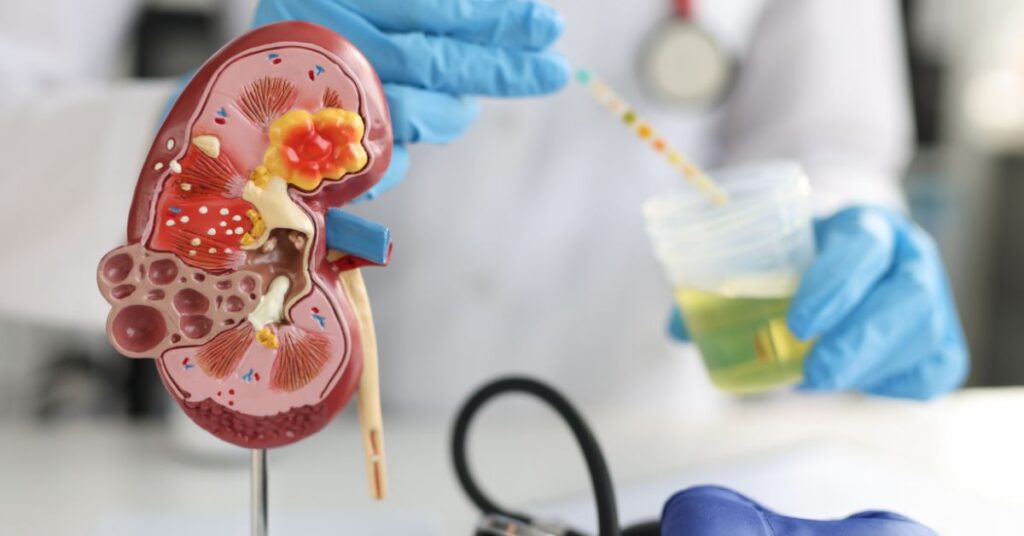Table of Contents

Kidney stones, medically known as nephrolithiasis, are solid deposits in the kidneys due to various factors. Although both men and women can develop kidney stones, women often experience unique symptoms and challenges associated with the condition. In this article, we will review the symptoms, diagnosis, treatment, and prevention strategies developed specifically for women dealing with kidney stones in 2024.
Types of Kidney Stones
Kidney stones can be divided into several types, including calcium stones, struvite stones, uric acid stones, and cystine stones. Each type may require different methods of treatment and prevention.
Causes of Kidney Stones in Women
The development of kidney stones in women can be attributed to a combination of factors, including dietary habits, genetic predisposition, lifestyle choices, and underlying medical conditions. Understanding these reasons is crucial for effective management.
Symptoms of Kidney Stones

In 2024, women with kidney stones may experience several symptoms, such as severe pain in the side and back, pain during urination, urgency and frequency of urination, presence of blood in the urine (hematuria), Nausea, vomiting, fever, and chills These symptoms can vary in severity and may require immediate medical attention.
Diagnosis of Kidney Stones
Diagnosing kidney stones in women usually includes a physical examination, imaging tests (such as ultrasound or CT scan), urinalysis, and blood tests to assess kidney function and the formation of stones. Any underlying conditions may be identified.
Treatment Options
Treatment of kidney stones in women may include pain management, medications to ease the passage of the stone, medical procedures such as lithotripsy or surgical removal, and dietary changes to prevent recurrence.
Prevention of Kidney Stones

Preventing kidney stones in women includes staying well hydrated, eating a balanced diet low in salt and oxalate-rich foods, taking prescribed medications to control underlying conditions, and exercising to reduce risk factors. Life involves making changes.
Impact on Women’s Health
Kidney stones can pose additional risks for women, especially during pregnancy, where complications can develop. Pregnant women with kidney stones need to receive special care to ensure optimal maternal and fetal health.
Psychological Impact
Dealing with kidney stones can affect a woman’s mental well-being, causing anxiety and stress. Using coping strategies, getting support from loved ones, and joining support groups can help reduce psychological distress.
Support and Resources
Numerous resources are available to women seeking information and support about kidney stones, including online forums, support groups, and educational materials provided by healthcare professionals.
Case Studies

The real-life experiences of women who have successfully managed kidney stones can offer valuable insight and inspiration for others facing similar challenges. These case studies highlight different treatment methods and outcomes.
Future Trends and Research
Advances in medical technology and ongoing research efforts hold promise for better diagnosis, treatment, and prevention of kidney stones in women. Keeping track of these developments can empower women to make informed decisions about their health.
Conclusion
In conclusion, kidney stones remain a major health concern for women in 2024, requiring proactive measures for prevention, prompt diagnosis, and effective treatment. By understanding the symptoms, causes, and available resources, women can take control of their health and reduce the impact of kidney stones on their health.
FAQs
- What are the main symptoms of kidney stones in women?
- The main symptoms include severe pain in the side and back, pain during urination, urgency and frequency of urination, blood in the urine, nausea, vomiting, fever, and chills.
- How are kidney stones diagnosed in women?
- Diagnosis usually includes a physical examination, imaging tests, urinalysis, and blood tests to assess kidney function and identify underlying conditions.
- Can kidney stones be prevented?
- Yes, preventive measures include staying hydrated, eating a balanced diet, taking prescribed medications, and making lifestyle changes to reduce risk factors.
- Are kidney stones more common in women than men?
- Although men are historically more prone to kidney stones, the prevalence among women is increasing, making it important for women to be aware of the symptoms and risk factors.
- What are the treatment options for kidney stones in women?
- Treatment options include pain management, medications, medical procedures such as lithotripsy or surgical removal, and dietary changes to prevent recurrence.
